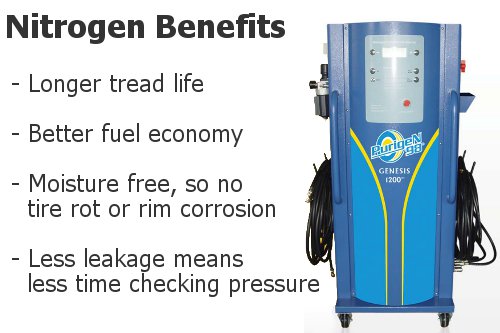Nitrogen In Your Tires – More Than Just a Gimmick
Benjamin | Jan 03, 2011 | Comments 2
Proper tire inflation is a good thing, and the number of media reports, government pamphlets, and tire shop recommendations over the years have really highlighted the benefits of making sure that your rubber is properly inflated. Better fuel economy, reduced tire wear, and increased grip and performance are some of the highlights associated with keeping tire inflation at the appropriate level.
But what about filling tires with Nitrogen instead of “Air”?
There is an interesting tool that drivers can make use of to help not only keep their tires more consistently inflated but to also reduce the wear and tear on their rims and rubber, and that is the use of nitrogen instead of air inside the tire itself. Nitrogen is an inert gas that makes up about 78% of “air”, but when used in its pure form for tire inflation, Nitrogen offers several benefits to vehicle owners.
Study Reveals Nitrogen Benefits
A recent study by Jalili and Venkataraman from the Dept. of Mechanical Engineering at Clemson University has offered concrete evidence that nitrogen inflation provides a number of advantages over traditional tire inflation methods, over both the long and short term. Let’s take a look at some of the study’s main points:
- Nitrogen holds tire pressure more effectively than air. This means that over time and the temperature variations that come with the seasons (and extended periods of driving), nitrogen is better able to maintain a consistent pressure inside a tire.
- Consistent pressure brings big benefits. If a tire’s pressure remains consistent, then not only does it offer less rolling resistance but it also wears much more evenly, extending the life of the tire. Less rolling resistance translates into savings at the fuel pump, and less wear means tires last longer – two important financial benefits.
- Nitrogen doesn’t rot rubber or rust rims. The air that comes out of a standard gas station hose is often quite moist, and trapping this moist air inside your tire and against your rim can slowly damage both over time (tires rot in the presence of too much moisture, and rims can corrode). Nitrogen, on the other hand, is completely dry. Filling a tire with nitrogen not only protects rubber and rims, but it also keeps other components such as tire pressure sensors and valves stems safe as well.

Special thanks to PurigeN98 for supplying a copy of the Clemson study and general technical assistance.
Much of the data gathered for the Jalili and Venkataraman study focused on fleets of trucks, as these vehicles are constantly on the road and go through tires at an accelerated rate. This provided the perfect environment for testing out the nitrogen-related theories of the pair, but it also means that it’s not possible to take the exact figures quoted in the study and directly apply them to passenger vehicles. The duo was aware of this fact, and in the study’s conclusion they were careful to indicate that regardless of the numbers involved, the benefits of nitrogen in passenger cars and trucks was clear and indisputable.
Nitrogen is relatively inexpensive, long lasting and available at a fairly wide range of tire shops and service stations. If you haven’t tried nitrogen in your tires, you owe it to yourself to give this tire inflation method a shot – especially if you are constantly on the road, where every little bit of fuel mileage and wear savings counts.
Note from Jason – Nitrogen-filled tires have one more benefit – nitrogen doesn’t contract as much during cold weather, so it’s less likely to trigger one of those pesky “low tire pressure” warning lights than regular air.
Comments? Disagree? A lot of people think nitrogen filled tires are just a gimmick despite the results of this study…
Filed Under: Maintenance Tips


If you want to pay for it, go for it. My air is free and if you check tire pressure at least once per month, you will be fine and saved some money.
mk – That’s what Benjamin told me when I asked him to write this article! 🙂
I think that people who check their tire pressure regularly wouldn’t benefit much from using Nitrogen. The people that don’t check pressure, however, would be much better off with something other than air.